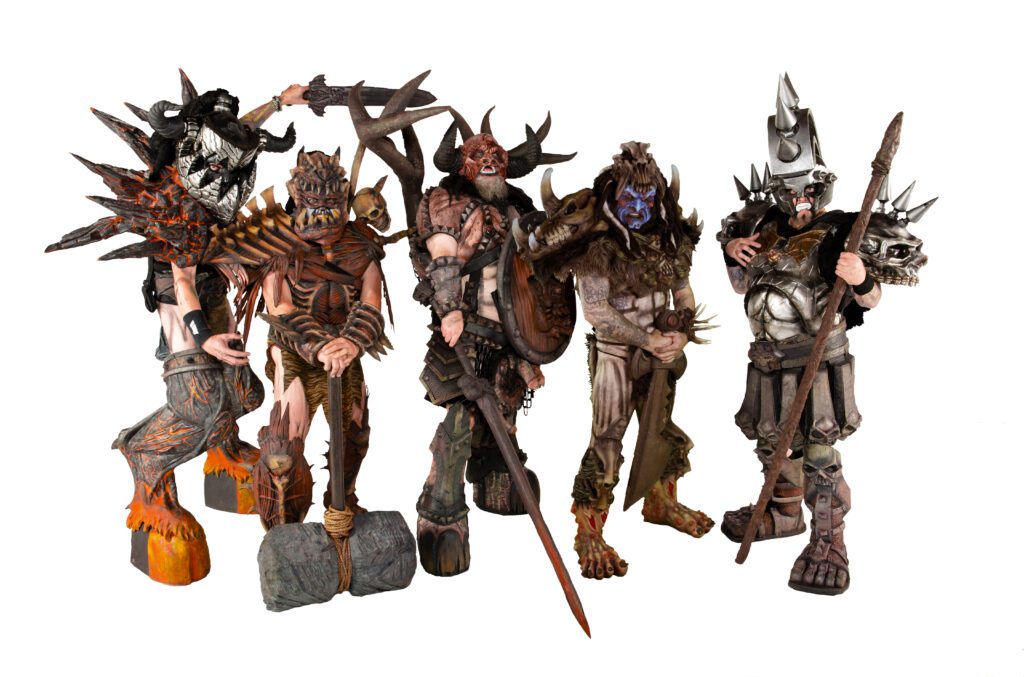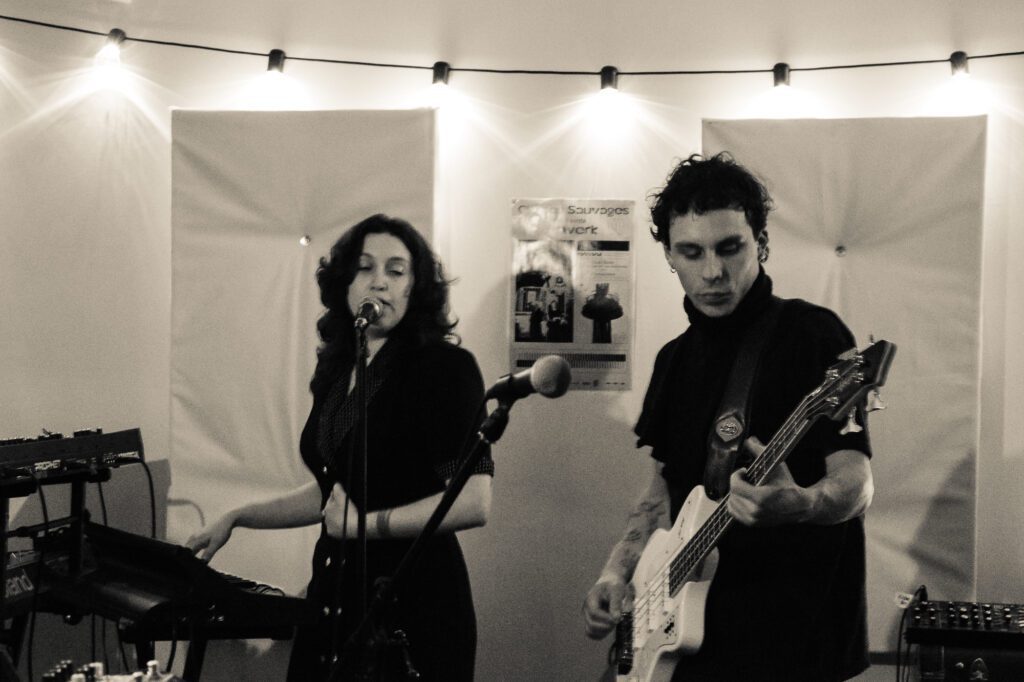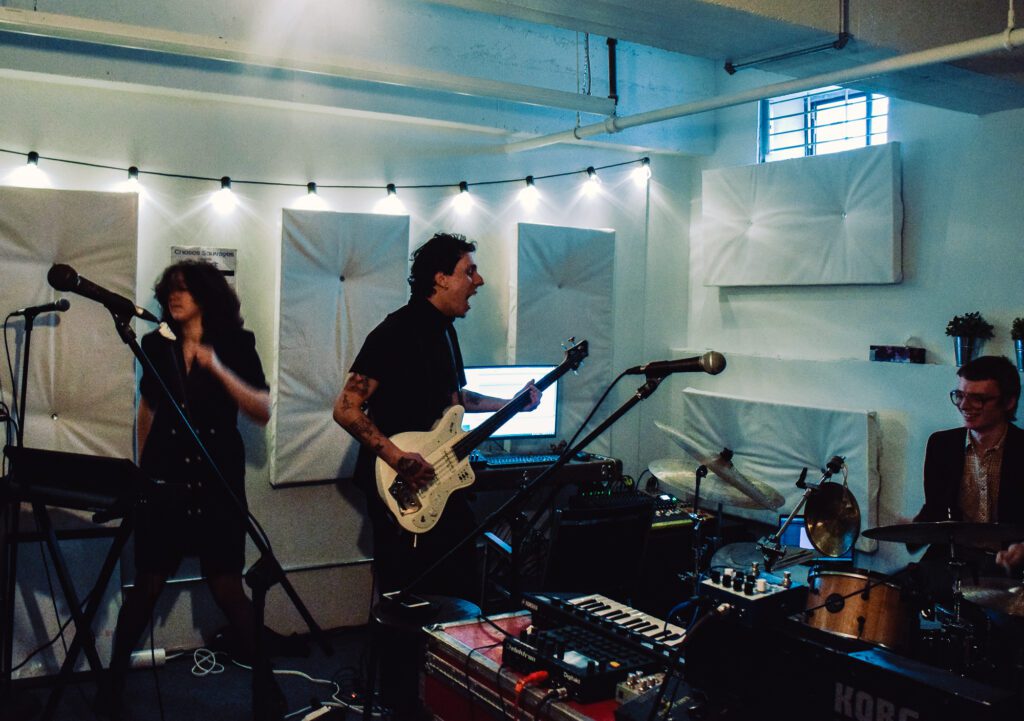When GWAR blew “The Horn of Hate,” Pustulus Maximus, the meanest member of the Maximus Tribe was summoned to Earth. Stranded in Antarctica since his Scumship was stolen, Pustulus Maximus has taken the lead guitarist role of the intergalactic alien rock band GWAR, since the passing of Cory Smoot (Flattus Maximus) in 2011.
Flattus Maximus returned to his beloved “Planet Home,” never to return to this mudball planet again. Out of respect to Cory, after the character Flattus Maximus was retired, Brent Purgason (Against the Grain, U.S. Bastards, and former Cannabis Corpse guitarist) joined GWAR’s ranks debuting with the band in a video on the A.V. Club, playing Kansas’ 1976 hit tune “Carry on My Wayward Son.”
GWAR has persevered through numerous deaths in their collective including singer Dave Brockie, (Oderus Urungus) – which left the group without any of its founding members. Returning to the killing fields, led by Blöthar the Berserker, 2017’s The Blood of Gods was an album that paid respect to the loss of Oderus and the struggles and triumphs that produced the new sound of the band.
The New Dark Ages, GWAR’s 15th studio album and newest record could be the most diverse GWAR record to date. the album’s story involves GWAR, now lost in the Duoverse (“like the multiverse, but it’s a little shittier”), joining forces with a “murderous maven” known as The Cutter and fighting off living monuments and undead soldiers waging a New Civil War. The New Dark Ages is the second GWAR album after Brockie’s passing, and the third album with guitarist Pustulus Maximus writing and performing lead guitar duties.
Speaking to PAN M 360, from their fortress in Antarctica, Pustulus Maximus tells us a bit about the new GWAR record, the companion graphic novel The Duoverse of Absurdity—the importance of fresh blood, and the regression of our species into a new dark age.
PAN M 360: How has Pustulus Maximus guitar style evolved since hearing “The Horn of Hate,” and entering the ranks of GWAR in your debut with the band in Battle Maximus?
Brent Purgason (Pustulus Maximus): Battle Maximus was another healing period for the band, when I had joined they had the majority of the material written. I was able to contribute to tracks like: “I Bonesnapper,” and “Madness at the core of time,” but for the most part, it was kind of there. My initial idea was not to part from the Flattus Maximus style too much at first. Once we were able to do The Blood of Gods, there was more freedom; we were able to write that album as a band together. Today’s GWAR has come into its own sound, our newest record The New Dark Ages, is a continuation of that, another record we were able to write together—this one really has no outside trauma.
PAN M 360: GWAR is currently embarked on “The Black Death Rager World Tour.” It’s a very busy time for GWAR to bring the bubonic plague to us mortals. What can you tell us about this upcoming GWAR invasion and what can we mortals expect?
Brent Purgason (Pustulus Maximus): This spring tour is a great tour and we are showcasing some songs off the new record, but this fall is when we’re going to debut an entirely brand new show, a new storyline encompassing all the themes and ideas touched on The New Dark Ages. It’s also going to highlight the companion piece The Duoverse of Absurdity, a graphic novel that goes with the new record. This fall is going to be awesome.
PAN M 360: Can you talk to us a bit about The Duoverse of Absurdity; you’re facing off against vomitous incarnations of yourself. Will the new characters from the album or comic, like The Cutter, make their way into the new live shows?
Brent Purgason (Pustulus Maximus): I don’t think there are any plans for a character like The Cutter making it onto the stage, the idea for her was pretty broad—The Cutter represents taking self-harm and directing it to harm others, which is kind of what GWAR does. We harm everyone else, we don’t harm ourselves. I don’t think there’s any mention of that character in the comics but it was fantastic working with Lizzy Hale (Halestorm) on that song.
PAN M 360: I know Pustulus, that you and Lizzy Hale are acquaintances having appeared on podcasts together. What was it like bringing her into the GWAR fold to represent a character in the universe?
Brent Purgason (Pustulus Maximus): Bringing Lizzy Hale on was great. She’s an amazingly talented human. Her abilities far surpass normal human abilities for sure; she might even be from another world, like us. She was awesome enough to want to do this with us and we definitely appreciate her contributions. She took a very small part of a song and made it huge; we are forever in her debt.
PAN M 360: GWAR has always been a unique collection of artists and musicians. Merged under one roof in 1984 creating art on their own terms, it’s a collective very much split generationally apart. What is needed to continue such a visceral concept and keep things interesting throughout all these years? Is it the belief, love, and voluntary devotion to this art form that keeps GWAR going?
Brent Purgason (Pustulus Maximus): Very similar to Nosferatu or Elizabeth Bathory, GWAR continues to thrive on fresh blood. As long as there’s a good supply we’ll always be able to continue. It’s really one of GWAR’s biggest strengths. Not only are we an art ensemble, but the cast and characters continues to increase. By continuing to bring new and young members into the band we can continue forever. Not to mention we are always guided by the guidance of our elders.
PAN M 360: There has been a lot of heartbreak and devastation in the ranks of the GWAR family. Can we talk a bit about pushing through those darker and tumultuous times as a band and how you’ve got through it as a band?
Brent Purgason (Pustulus Maximus): GWAR is such a monumental force in all our lives; it doesn’t really become an option to quit. It would be like taking something that’s in every part of your being and trying to reinvent yourself into something new without it, it’s simply not an option. GWAR will persevere through any challenge, any tragedy it has to face, as hard as it may be at any time.
PAN M 360: Across the 15 tracks on The New Dark Ages, there’s an eclectic ability for GWAR to jump between genres while keeping its roots heavy. GWAR has never been a band who’s been afraid of genre constraints, bUT can you talk to us a bit about The New Dark Ages, these songs, and the metal genre of music.
Brent Purgason (Pustulus Maximus): The New Dark Ages, as far as stylistically things are considered, it’s all the same to me: Distorted guitar, offshoots of rock n roll, and heavy metal. You can say it’s an eclectic record, that’s fair, but to me, they’re all branches on the same tree. As far as the themes contained there within, humanity has trapped itself with its own technology. In doing so with the rejection of science and the rejection of knowledge, as a race, humanity has returned to the dark ages. There’s no light at the end of the tunnel. You’re regressing as a planet and as a species.

PAN M 360: Some concepts Blöthar the Barbarian expresses in The New Dark Ages have to do with lies, liars, and moral ambiguity. Over the course of a few tracks, he expresses how, “lies have become contagious,” how “ancient lies are recycled,” or GWAR’s hate of “Mother Fucking Liars.” How do lies represent The New Dark Ages?
Brent Purgason (Pustulus Maximus): “Mother Fucking Liar” is a very loaded track. It’s probably the track with the least amount of lyrics but the most serious theme. It’s not only about liars and two-faced political parties, it’s also about humanity’s obsession with cancel culture and not just the black and white view most people have. With cancel culture, you not only shut someone down but you prevent the ability for that person to ever grow by defining a being by a single action. This is fine for us because GWAR doesn’t care about the affair of humans, but we like to point out your flaws and rub your nose in them, which is why that song is important to us. In that respect, it also reflects politicians like Donald Trump and the war on the truth in the media—that you can present someone with evidence and they can flat out deny it, it’s true for both people on the left and right; they’re maniacs on both sides.
PAN M 360: With GWAR’s rich history of killing, dismembering, and maiming people which displease them are there any “Mother Fucking Liars,” getting the axe this time around?
Brent Purgason (Pustulus Maximus): President Joe Biden is usually the first victim on this tour. He seems to think he can hijack the GWAR show and use it as a platform for political peace. If you are not a member of GWAR and you try to get on stage with us you will quickly be dispatched and your bodily fluids will be on the audience in a celebration of your death.
PAN M 360: Can you talk to us a bit about the humans behind GWAR. In July, GWAR will release a documentary about the human thralls which make GWAR possible.
Brent Purgason (Pustulus Maximus): It takes a lot. By watching the documentary, you’ll plainly see how much of each person’s lives this band occupies, which is pretty much all of it. It’s very much who we are to the core of our character. The documentary does a good job showing that there is a lot that goes on behind the scenes and there is a human side to it. We are easily dismissed as a costumed rock band. We’re a theatre troupe makings its way in a rock and metal world, playing venues traditionally reserved for rock bands … No theatre or opera house is going to let us cover the hall in blood and guts, it’s really like Monty Pythons Flying Circus for us mixed with heavy and lewd political satire – it takes a lot of creative ideas and creative people to pull together and make these things happen.
PAN M 360: GWAR and the band Ghoul are good friends in the heavy metal world. The last GWAR concert I caught, I believe those maniacs from Creepsylvania opened for you. What did GWAR teach those young axe murderers, and was it fun bringing another band known for their bloodletting on the road with you?
Brent Purgason (Pustulus Maximus): Ghoul is great. They’re a band that apparently never learned all the lessons GWAR has tried to teach them and they’ve repeated the very same mistakes GWAR has made time and again on the road. It is hilarious to watch. GWAR used to tour in a school bus, but it broke down all the time and didn’t go very fast. Ghoul thought it was a good idea to tour in a similar bus and it’s currently stranded in the middle of Wyoming. It didn’t survive one tour. Hilarious—because it’s not our problem, but if it was up to us, we would only tour with Ghoul. They’re more so a heavy metal band, the theatrics are important to them, but they’re not spilling the same amount of blood as us onstage.
PAN M 360: How important is showering to you after a GWAR show?
Brent Purgason (Pustulus Maximus): It’s definitely important to me. I can’t go a single day without showering—it’s about hygiene and staying healthy on the road. There’s this thing imbedded in some people’s heads that they have to live up to their punk rock street cred and be gross all the time, which is fine but if you’re sick for a couple of days it could cause the company hundreds of thousands of dollars. It’s not just money we put in our pockets, but money to pay for the bus, hotel, production, trucks, etc. In my head, not taking care of your body is a bit selfish, but whatever we’re a rock band—you got to be ready to get your asshole licked at any time of the day so it’s good to take a shower.
PAN M 360: As the human thrall for Pustulus Maximus, I believe you’ve almost hit five years of sobriety. Congratulations on that by the way. Has it been easier to balance your busy work and life schedule with a clear head? How much has that helped you as a touring musician these last few years?
Brent Purgason (Pustulus Maximus): 100 percent. Thanks for paying attention to that aspect of my life and what I’ve been doing and accomplishing, I appreciate that. I wouldn’t have all the things on my plate if I was still out drinking and getting high. Some people can do it and stay in control others completely lose control. Drinking all those years I was a high-functioning alcoholic, I could still get a lot done but something I couldn’t accomplish as effectively or accomplish all the way to the best of my abilities. I’ve always been in the habit of putting too much on my plate, but doing this now with a clear mind I’ve been able to now live the life I want and everything has improved so greatly. Touring with older people and watching some of your idols fall, made me think about how much I want to do this forever. Being sober and taking care of yourself is a very important step in the longevity of the touring life.
PAN M 360: I read recently that Fleetwood Mac’s Christine McVie said cocaine and champagne made her performances better during her time with that band. Are there any performance-enhancing drugs GWAR recommends to aid in the bloodletting, not necessarily the human thrall Brent Purgason, of course?
Brent Purgason (Pustulus Maximus): GWAR always recommends crack cocaine.
PAN M 360: Is crack cocaine the defining drug in the GWAR mythology?
Brent Purgason (Pustulus Maximus): It is, simply because Earth is the only place in the universe where you can find crack.
PAN M 360: Does GWAR have an opinion on the ongoing conflict in Ukraine?
Brent Purgason (Pustulus Maximus): GWAR does not have a political opinion on the Ukraine conflict, other than we would hope the United States and Russia will team up together and bring back the bomb, fast-forwarding humanity’s destruction on the face of the earth.
PAN M 360: What is your take, Pustulus, as the monster with the most skin lesions, on Monkeypox? How do you feel about this infectious virus infecting humanity? Making their skin blister and boil?
Brent Purgason (Pustulus Maximus): Hopefully Monkeypox will be a great sequel to Covid-19 and we hope to bring some back and cultivate it in the United States when we return from Europe this summer.
PAN M 360: Pustulus you’ve personally killed both Santa Claus and Jesus Christ. Does GWAR still celebrate the holiday season after you massacred the two most important Christmas deities?
Brent Purgason (Pustulus Maximus): GWAR are very much into the spirit of receiving around the Christmas season. We never feel very spiritual but New Year’s Eve is always a good time for GWAR to celebrate and try to cause the potential end of the world. That’s why we have our new alcoholic beverages for sale, there’s nothing planned yet but hopefully, something will be in the works.
PAN M 360: There’s so much going on in the world of GWAR right now. Is there any last thing GWAR would like to say to humanity in these new dark ages?
Brent Purgason (Pustulus Maximus): Europe this summer, then the USA in the fall. We’ll be recording something secret in the background that we can’t talk to you about yet, but there’s always something new coming out in the GWAR universe.


